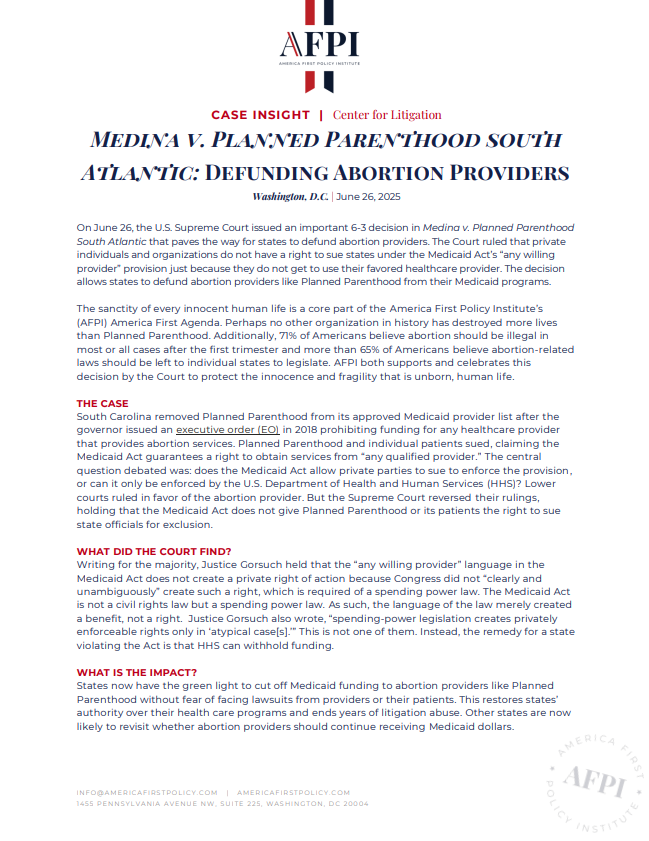Medina v. Planned Parenthood South Atlantic: Defunding Abortion Providers
Washington D.C.— On June 26, the U.S. Supreme Court issued an important 6-3 decision in Medina v. Planned Parenthood South Atlantic that paves the way for states to defund abortion providers. The Court ruled that private individuals and organizations do not have a right to sue states under the Medicaid Act’s “any willing provider” provision just because they do not get to use their favored healthcare provider. The decision allows states to defund abortion providers like Planned Parenthood from their Medicaid programs.
The sanctity of every innocent human life is a core part of the America First Policy Institute’s (AFPI) America First Agenda. Perhaps no other organization in history has destroyed more lives than Planned Parenthood. Additionally, 71% of Americans believe abortion should be illegal in most or all cases after the first trimester and more than 65% of Americans believe abortion-related laws should be left to individual states to legislate. AFPI both supports and celebrates this decision by the Court to protect the innocence and fragility that is unborn, human life.
THE CASE
South Carolina removed Planned Parenthood from its approved Medicaid provider list after the governor issued an executive order (EO) in 2018 prohibiting funding for any healthcare provider that provides abortion services. Planned Parenthood and individual patients sued, claiming the Medicaid Act guarantees a right to obtain services from “any qualified provider.” The central question debated was: does the Medicaid Act allow private parties to sue to enforce the provision, or can it only be enforced by the U.S. Department of Health and Human Services (HHS)? Lower courts ruled in favor of the abortion provider. But the Supreme Court reversed their rulings, holding that the Medicaid Act does not give Planned Parenthood or its patients the right to sue state officials for exclusion.
WHAT DID THE COURT FIND?
Writing for the majority, Justice Gorsuch held that the “any willing provider” language in the Medicaid Act does not create a private right of action because Congress did not “clearly and unambiguously” create such a right, which is required of a spending power law. The Medicaid Act is not a civil rights law but a spending power law. As such, the language of the law merely created a benefit, not a right. Justice Gorsuch also wrote, “spending-power legislation creates privately enforceable rights only in ‘atypical case[s].’” This is not one of them. Instead, the remedy for a state violating the Act is that HHS can withhold funding.
WHAT IS THE IMPACT?
States now have the green light to cut off Medicaid funding to abortion providers like Planned Parenthood without fear of facing lawsuits from providers or their patients. This restores states’ authority over their health care programs and ends years of litigation abuse. Other states are now likely to revisit whether abortion providers should continue receiving Medicaid dollars.
